Audi E-tron GT review
From £107,7608
Updated electric four-door is almost entirely new underneath, but is the recipe actually improved?


Published:
11 April 2025
- Introduction
- Design & styling
- Interior
- Engines & performance
- Ride & handling
- MPG & running costs
- Verdict
- Prices & specs
- Introduction
- Design & styling
- Interior
- Engines & performance
- Ride & handling
- MPG & running costs
- Verdict
- Prices & specs
Find Audi E-tron GT deals
Other Services

Although it is keeping its options open regarding the future use of hybrid and ICE powertrains, Audi’s electric rollout is now in full swing and it all started in 2020 with the statement-making Audi E-tron GT.
Looking every inch ‘Vorsprung durch Technik’, this sleek, four-door coupé was the result of a joint R&D programme with Porsche. The Taycan would cater to the driving enthusiast and person who had to have the last world in performance and feedback, and the E-tron GT? It was the more subdued of the two and also, we would learn, the more relaxing company, yet far from blunt to drive.
Now it has been updated – and comprehensively so. Is it any better? Let’s find out.
https://www.drivenbuy.co.uk/autocar?car_make=audi&car_model=e-tron-gt&review=new&source=https://www.autocar.co.uk/car-review/audi/e-tron-gt
Verdict

Model tested:
Rating: 8
Audi E-tron GT
Colossally capable on motorway and country road alike. Expensive, but new tech raises the car’s game considerably
Good
Staggering point-to-point pace for a large, luxurious car
Superbly refined, thanks in part to its active suspension
Faster-charging and longer-legged than before
Bad
Rear leg room is a weakness compared with the Lotus Emeya
Prices start at nearly £110,000 for the basic S E-tron GT
DESIGN & STYLING
9
Pros
Weight is down, if only a small amount
Chassis tech is at the cutting edge, for a price
Even more power and torque than before
Cons
Remains a surprisingly wide car
Added range isn’t game-changing
Mechanical toy-box limited on the S

So what are these changes, which need to justify a hike in base price from just over £85k in 2021 to the thick end of £110k now?
Foremost among them is an upgraded, 105kWh battery pack, which weighs 9kg less than before (at 625kg it still isn’t light) but has 12% more capacity and gives the Mk2 374 miles of claimed range.
This ought to address at least in part the old E-tron GT’s most glaring weakness, which was that its effective motorway range of around 240 miles couldn’t hope to cash the continent-crushing cheque written by either the look of the thing or the name itself. The new car should go meaningfully farther in the real world.
The maximum charging speed has also increased, from 270kW to 320kW, although engineers say the real improvement is the way the Mk2 will sustain near-300kW speeds for longer. The old 93kWh battery apparently needed to be inside a 5deg C window in order to charge optimally; the new one is more versatile. It will in theory gain 175 miles in just 10 minutes.
Then there’s power: there’s rather a lot more of it now, to the extent that even the base model tested here feels quicker point-to-point than an RS6 Avant. Whereas the Mk1 made 469bhp in its meekest guise and 637bhp in brain-out RS form, for the Mk2 the stakes start at 671bhp in the S E-tron GT, rising to 845bhp in the RS and 912bhp in the 2.5-sec-to-62mph RS Performance.
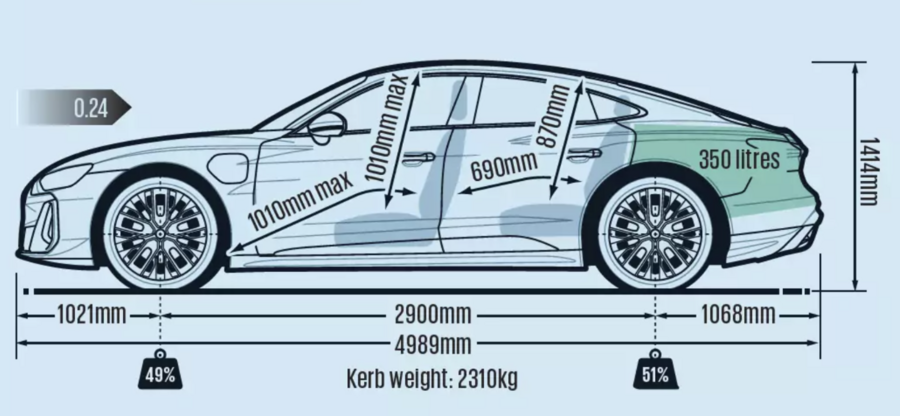
It all sounds crackers. But power is relatively cheap in the electric age. Audi hasn’t even had to upgrade the two-speed gearbox on the back axle, and the 236bhp front motor is unchanged in hard terms. The rear motor is new, however. With an axial length of 192mm and a diameter of 230mm, it is not only responsible for the Mk2’s colossal uplift in power but is also more compact and around 30kg lighter than its predecessor.
Audi has also wisely seen fit to overhaul the car’s brakes. The 390mm discs at the front of the S are 40mm wider in diameter than the previous version’s, and both the RS models have tungsten carbide coated discs (optional on the S).
While the standard E-tron GT and the RS version used to look largely identical, Audi has taken this opportunity to differentiate them further. As a result, the S E-tron GT (shown in the schematic above) now has silver triangular inserts in the front air dam, similar to Audi’s combustion-powered S models.
Meanwhile, the RS models have more aggressive L shaped inserts, which optionally can be made from a new ‘camouflage’ carbonfibre on the Performance model as part of a carbon pack. Further visual alterations include an embossed hexagon pattern for the front mask, and a redesigned diffuser with a central reflector on the RS models. A selection of optional new wheel designs and paint choices are available too.
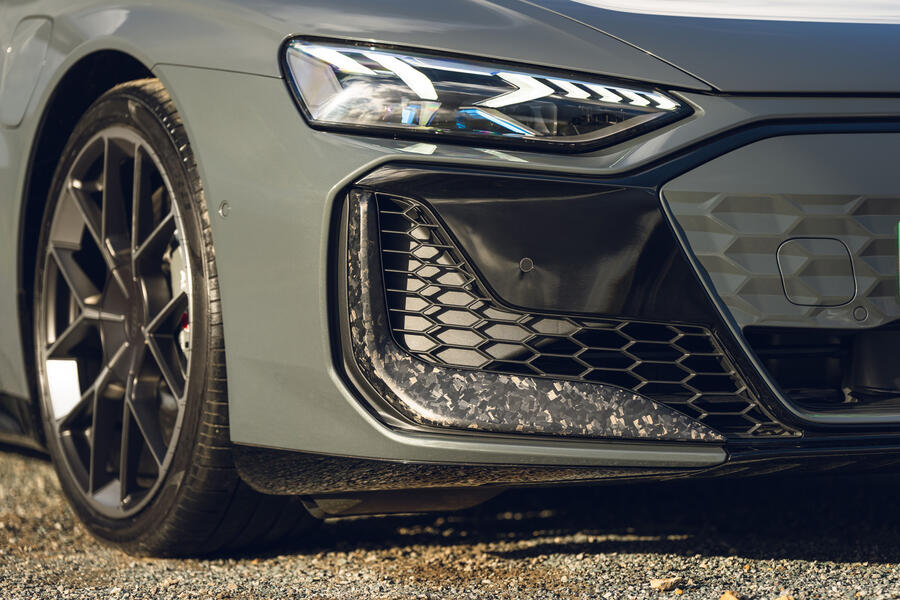
More broadly, the GT, tested here in entry-level S specification, remains characteristically heavy. Our car tipped the scales at 2361kg, albeit with an excellent weight distribution of 49:51 front to rear. Mind you, such weight is also not unusual for this type of car. Maserati’s Granturismo Folgore – a two-door coupé – weighed only 3kg less than the Audi when we tested it this year, and is less practical.
Ultimately, how technologically advanced your particular E-tron GT is will depend heavily on which model you go for. If you want the headline-making new active suspension, as already seen on the Taycan, or carbon-ceramic brake discs, you’ll need to at least opt for the RS model, and possibly option it to all-bells-and-whistles Vorsprung level at considerable expense.
If you don’t option the £5495 Technology Pack Pro, which adds rear-axle steering, it leaves the S as a rather basic proposition, which is how we have it here. Is basic best? Time to find out
INTERIOR
8
Pros
Feels special, both in layout and materials
Has a good smattering of proper switchgear
Cons
No increase in wheelbase, so rear legroom is still tight
Squared-off steering wheel is a little odd
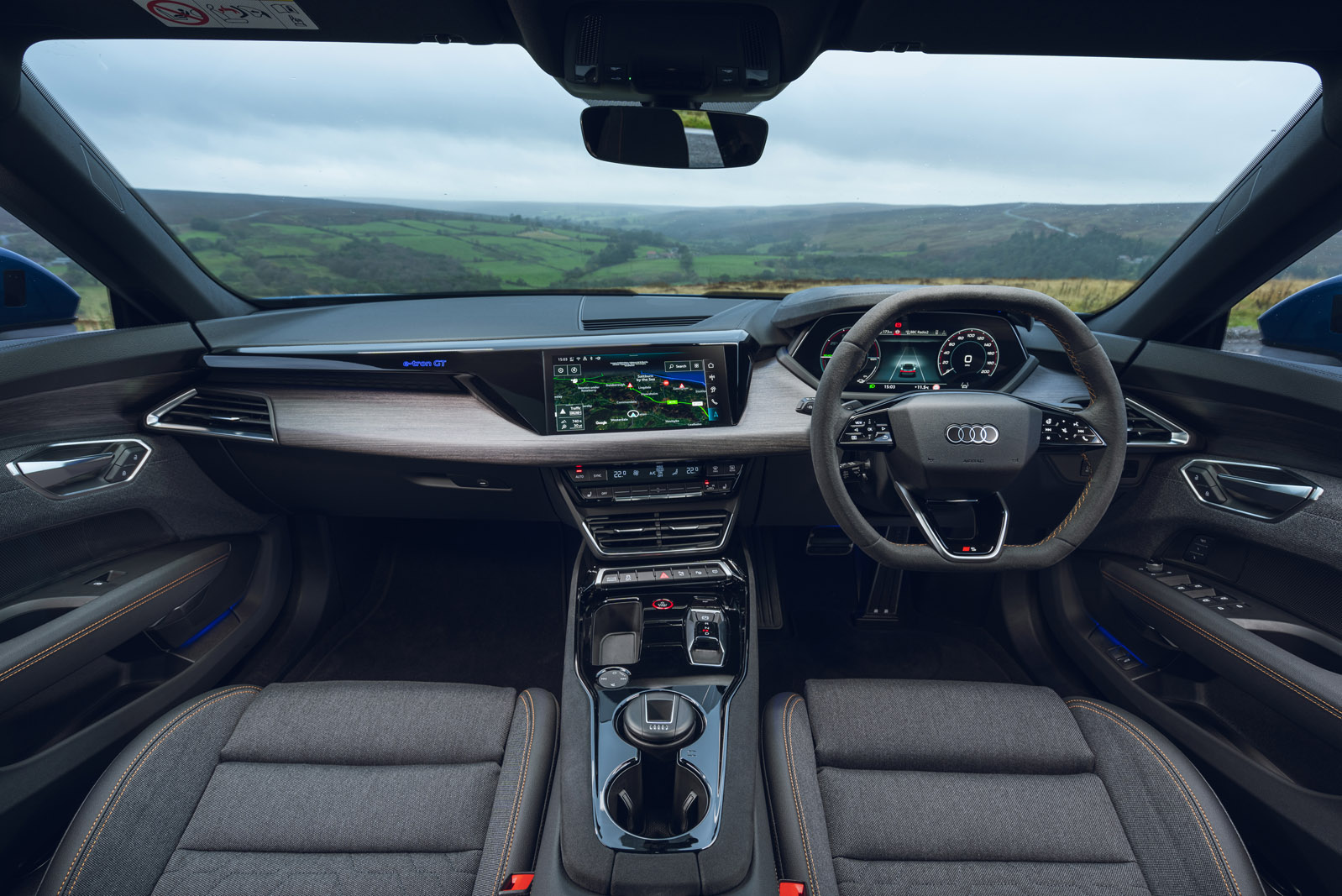
The basic layout of the E-tron GT hasn’t much changed. All the major controls are left where they were in the pre-facelift model, and there remains the same expansive, curved dashboard and high-ish window lines that create an ambience that’s halfway between trad super-saloon and proper sports coupé.
It’s a lovely space, and the enormous panoramic roof now uses polymer-dispersed liquid crystals, so it can change from transparent to opaque at the touch of a button.
A more questionable update is to the slim steering rim, which is now squared off at the top and bottom. This is still a pleasingly classic wheel in its overall size – it’s a little larger in diameter than that of the Porsche Taycan, the Audi’s sister car – and twirling it is effortless, but the angles won’t be for everyone.
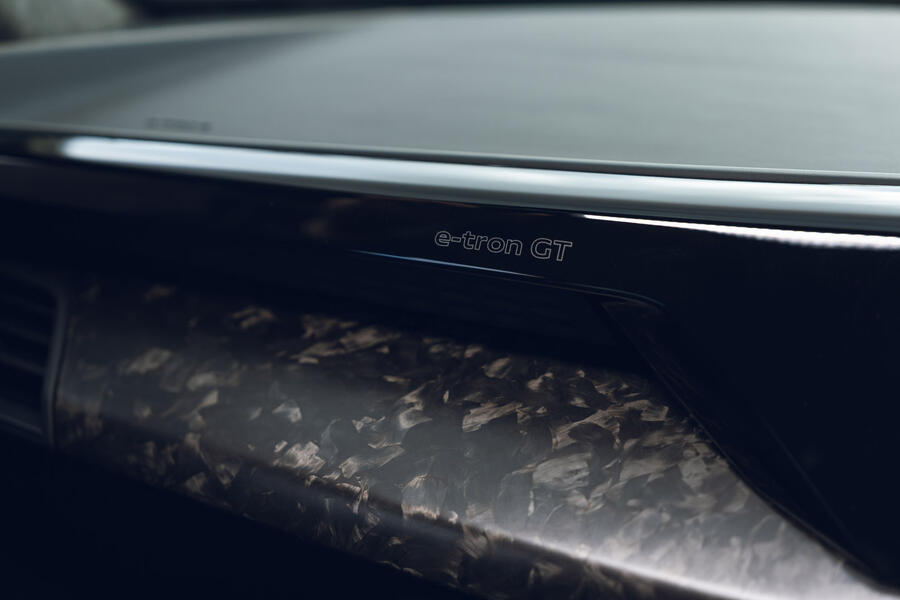
We’re also unconvinced by the new control panels on the spokes. There’s plenty of functionality here, but the proper buttons of the old car were nicer to use and it’s now easy to accidentally change the media volume.
Elsewhere, the graphics of the virtual cockpit and sensibly sized central touchscreen have been tweaked to keep them looking fresh, and there are some new trim options available, although UK buyers have much less personalisation to play with than their German counterparts.
One change is that you can now opt for a leather-free option that swaps the usual dead cow for quite an appealing fabric.
On the S model, you can swap the usual silvery-grey trim inlays for birch wood, while on the RS Performance, you can have camouflage-patterned carbonfibre.
ENGINES & PERFORMANCE
8
Pros
Trust us: you don’t need to go faster than what the S offers
Brake pedal-feel is improved in normal driving but remain woolly in demanding situations
Lots of regen capability, and there’s a coasting mode
Cons
Slightly one-dimensional pace, in the manner of most EVs
Immensely fast and immensely heavy – do pay attention
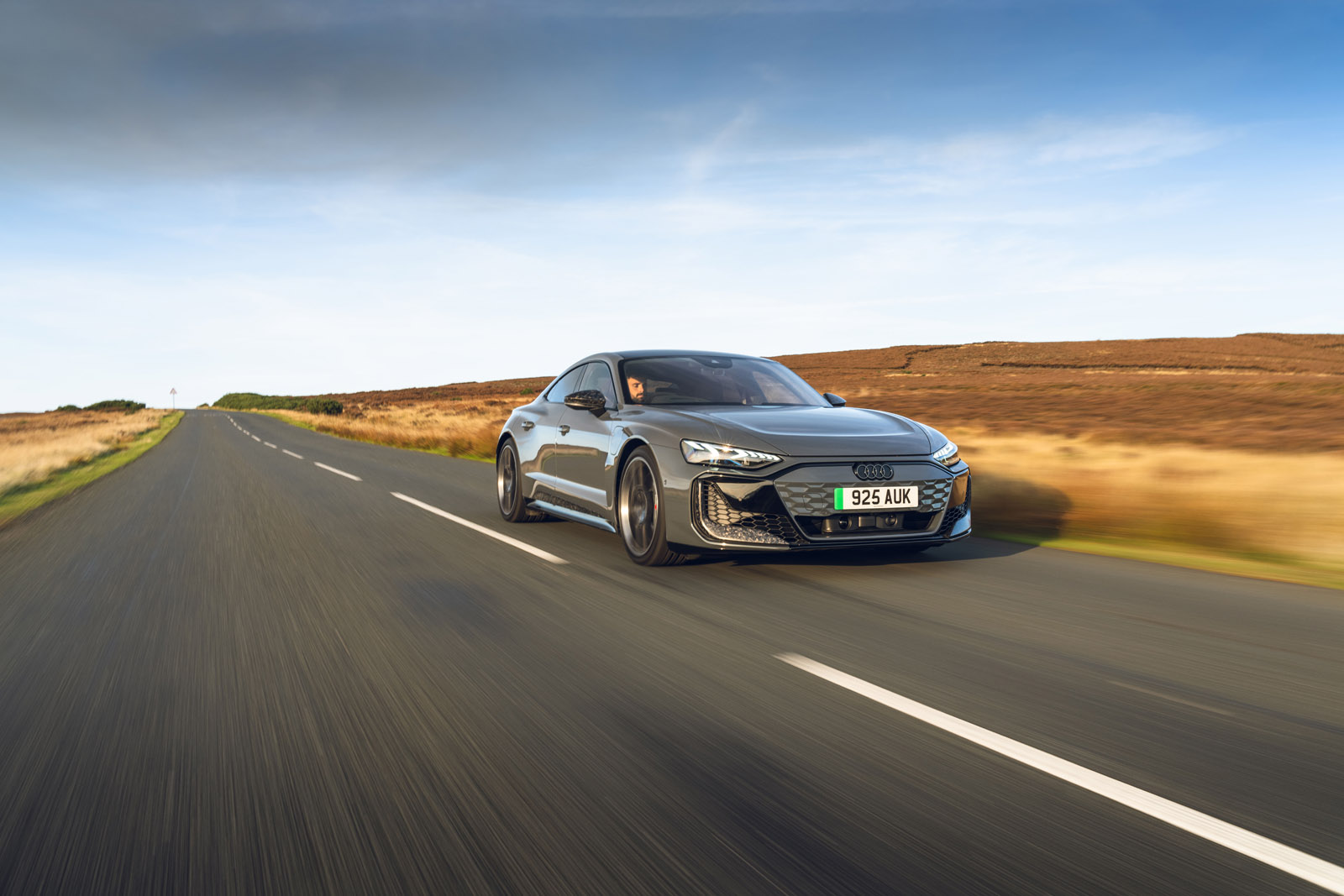
When we said even the base S E-tron GT feels faster than an RS6 Avant, we meant it. With 671bhp on tap, this is an extraordinarily quick car and, of course, one with that immediacy of torque delivery that is typical of an EV.
The base E-tron GT has been given quite the uplift in power and at Horiba MIRA it proved even quicker off the mark than claimed (check out the figure below). A 0-60mph time of 3.1sec is nipping at the heels of bona fide supercars, and comes as a result of this chassis’s ability to put almost all of its 546lb ft to the ground cleanly and – more importantly – instantly.
The 6.8sec time to 100mph is a little steadier (relatively speaking), and we know that the updated Taycan Turbo S rattles off the same increment in just over five seconds. But be in no doubt: the S E-tron GT has a turn of pace, both off the mark and in terms of roll-on acceleration at intermediate speeds, to shame almost any comparatively priced petrol car. And it is the insouciance with which it reveals that pace hat leaves an impression.
Even in Dynamic mode, where the car’s futuristic, synthesised sound is at its most noticeable, the GT is relatively laid-back and undramatic. This characteristic – of speaking quietly but carrying a big stick – suits the Audi well and feeds into its aura of being a quietly very capable saloon-cum-sports car.
Mind you, in one respect the GT is just a bit too relaxed. The woolly brake-pedal feel of the pre-facelift car has perhaps been mitigated a little, but it is still conspicuously lacking in resistance and feel compared with the Porsche Taycan – and indeed most cars of this performance level.
In normal driving this can go unnoticed, because you will be relying on the regenerative braking effect alone much of the time. (And, on a related note, the car’s ability to completely freewheel is still welcome.) However, unexpected stops can be a little heart-in-mouth, such is the pedal travel required to get the cast-iron brakes really working. It’s an oversight in a car that otherwise feels supremely dependable.

We’ve also tried the RS Performance, and with 912bhp during launch control (a mere 737bhp normally), it’s violently fast. When you deploy it all on a damp road, the rear wheels will squirm and scrabble slightly but otherwise deploy the power with little drama.
Interestingly, the RS Performance model has a dedicated mode in which propulsive force is doled out with even more precision and a little extra shape in the delivery, but the standard car doesn’t suffer for not having this feature: it’s easy to summon exactly the amount of acceleration you want, when you want it.
Working away behind the scenes is the same two-speed rear gearbox as before. It generally engages second gear when pulling away, for maximum smoothness, although if you engage Dynamic mode, you can still hear it dropping into first. It’s a little quirk of the E-tron GT that adds a bit of mechanical engagement, and from a standing start you can feel the second ratio hit home at around 65mph.
RIDE & HANDLING
8
Pros
Plenty of grip and poise
Intuitive steering
Active suspension is quite special at time
Cons
Not the quietest car at a cruise
Basic S can feel a little unsophisticated at times
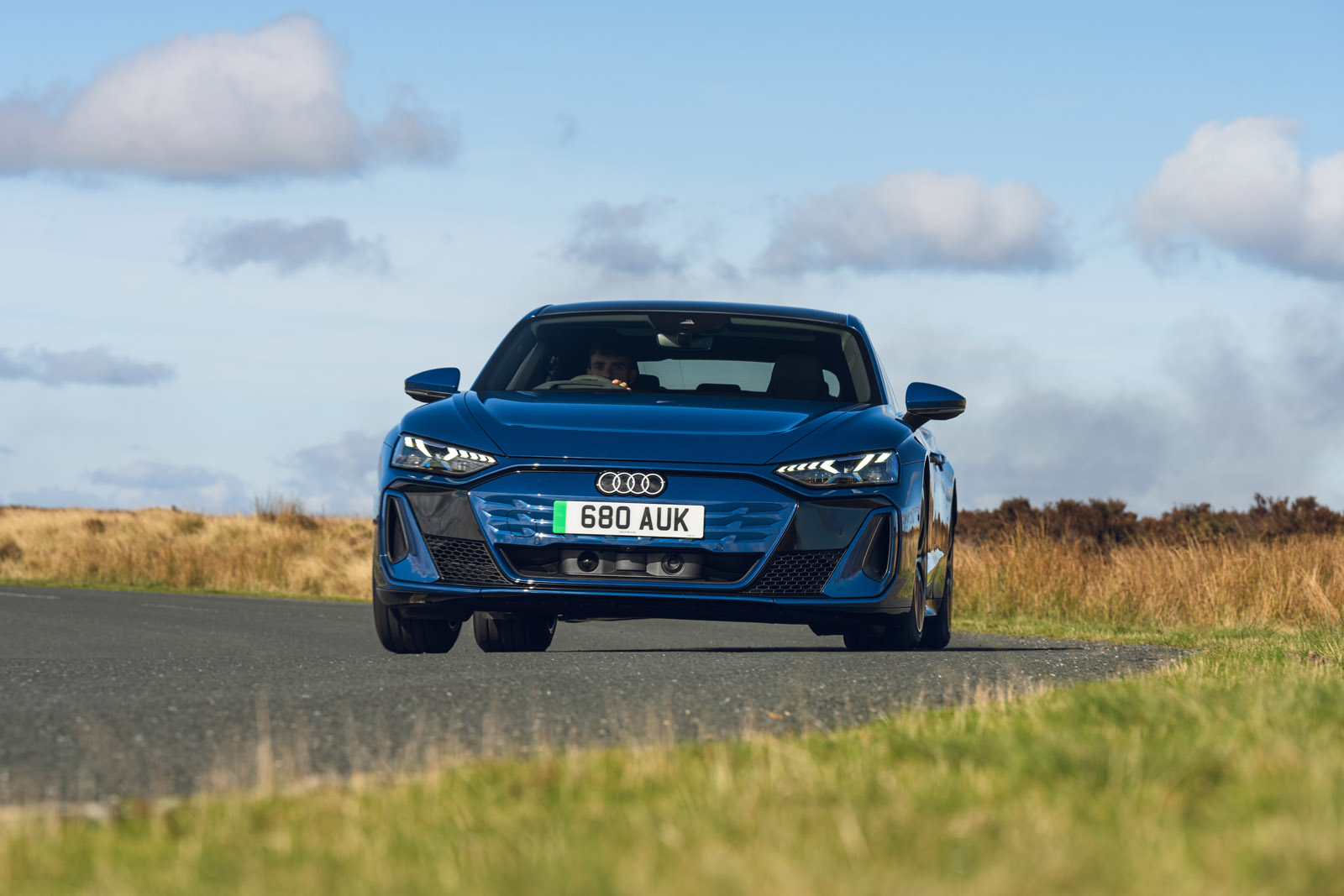
Having recently tested the Taycan Turbo S, it was interesting to get to grips with this S E-tron GT, which is built around the same J1 II platform but goes without that car’s hydraulically controlled – and at times revelatory – Active Ride Control and also rear-steering (although both are available on RS models). The E-tron GT, of course, also has Audi philosophy engineered into its handling characteristics, rather than Porsche’s sharper approach.
The result is two entirely different cars. Yes, there is a fundamental similarity in the way the steering (2.5 turns lock to lock in both) combines with the platform’s low centre of gravity to give a decidedly ‘well-engineered’ feeling in both. But the Active Ride Control (which can in effect not only absorb inputs from the road surface but also exert force onto it) has moved the game on in terms of both control and compliance, and without it the E-tron GT feels a touch off the pace for a frontline electric super-saloon.
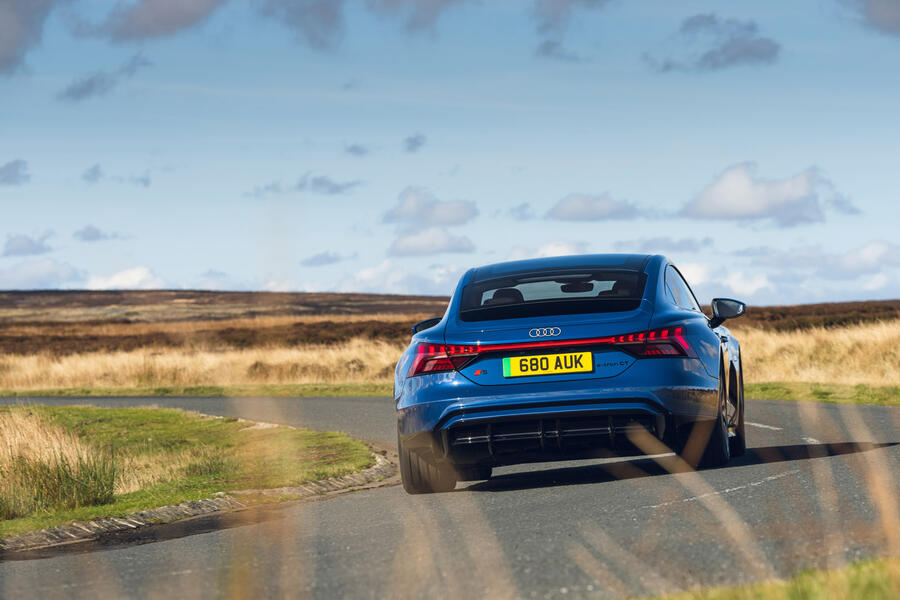
When you factor in the Audi’s more pronounced understeer balance (easily cancelled out with the accelerator, if you ever happen to turn all the driver aids off in a circuit environment), its dynamic prowess doesn’t always make good on the promise of those stunning looks. There’s just a bit too much latency in the way direction changes unfold – the GT corners flatly, but with little in the way of alacrity or expression. At least, that’s how it seems once you have had a go in a Taycan with plenty of chassis kit.
Equally, if the E-tron GT has a broader role to play, it is that of an ultra-stable and composed sibling to the Porsche, and it acquits itself well in those respects. You are unlikely to have traction issues unless you go looking for them, and though it lacks some bite compared with the Taycan, the E-tron GT’s ability to change direction would be the envy of many a similar-sized ICE saloon.
Audi E-tron GT news
Video | Audi e-tron GT: electrifying RS performance
Video | Audi e-tron GT: electrifying RS performance
MPG & RUNNING COSTS
6
Pros
Huge performance for the money
Very fast charging, competitive range
Cons
Porsche’s excellent Taycan is available for less
The active suspension is available only on top-spec cars
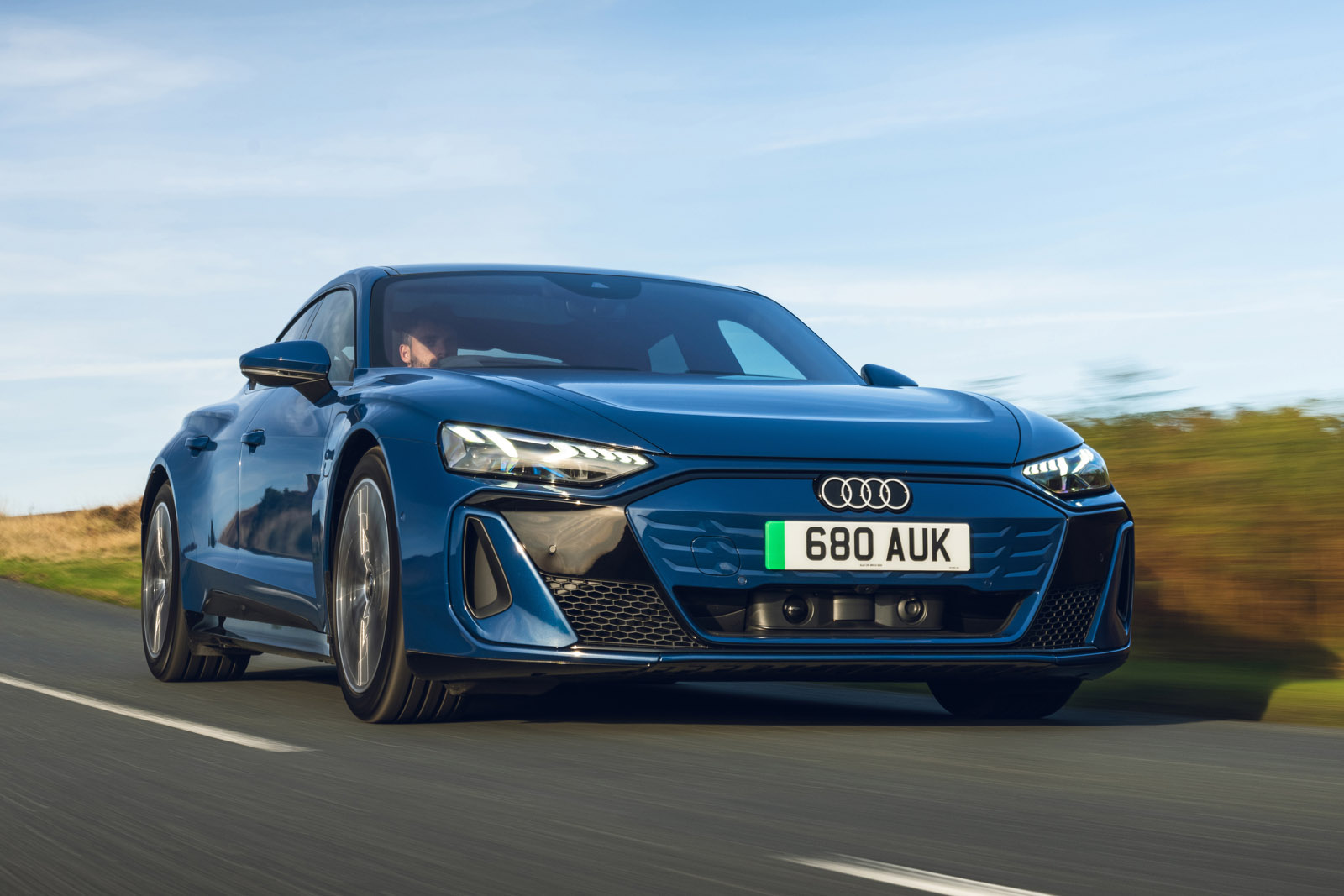
Unsurprisingly, the E-tron GT has become more expensive, and perhaps conspicuously so, given the discounted rates at which the original car has recently been offered, even with delivery miles. The range now starts at nearly £110,000 for the S Black Edition, rising to more than £160,000 for the RS Performance with the highest level of optional equipment.
By comparision, the Taycan range starts at £85,600, albeit for the purely rear-driven, considerably less powerful entry-level model. In terms of performance, the 671bhp S E-tron GT very neatly (and of course deliberately) splits the difference between the £96,000 Taycan 4S and the £134,000 Taycan Turbo. As for the Lotus Emeya, in general the Audi is priced a little higher, but they are quite closely matched.
Alas, there is a caveat here: in the UK, the active suspension is available only on Vorsprung-spec cars, with anything less getting an updated version of the old’s car adaptive air suspension. And even in entry-level S E-tron GT guise, Vorpsrung trim is priced at £130,30, although you do also get the rear-axle steering that so usefully trims the car’s turning circle and a host of other extras.
It’s a shame, because buyers in Germany have more flexibility. Over there, a basic S E-tron GT fitted with the active suspension (€7000) and accoustic glazing (€690) can be ordered and would be just the ticket. Audi UK says it may be added as a separate option in the future.
While the entry-level Taycan comes with a smaller battery, all E-tron GTs have the same 97kWh (usable) pack. How far that potentially takes you depends on which version you choose. Given that all E-tron GTs have dual motors, they will never be as efficient as a single-motor Taycan. See below for the data on our S E-Tron GT test car










